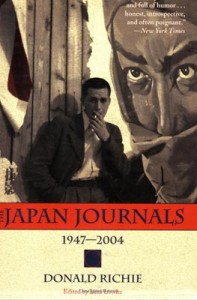Donald Richie and the Japan Journals: A Tribute
Peter Tieryas Liu previously wrote about Donald Richie and his Japan Journals on HTMLGIANT (read the full review here).
And now this great video:
Donald Richie and The Japan Journals
 The Japan Journals: 1947-2004
The Japan Journals: 1947-2004
by Donald Richie
Stone Bridge Press, 2005
496 pages / $18.95 Buy from Amazon
Donald Richie passed away on February 19, 2013. Many people knew him as the preeminent critic of Japanese film, bringing attention and exposure for directors like Akira Kurosawa and Yasujiro Ozu to Western audiences. “Whatever we in the West know about Japanese film, and how we know it, we most likely owe to Donald Richie,” director Paul Schrader declared. I became familiar with his work through his Japan Journals which was edited and compiled by Leza Lowitz, covering his life from 1947-2004. It’s a hybrid work that is in part autobiography, a compendium of Japanese culture, a menagerie of famous writers and directors, and a confessional. Richie first visited Japan in 1947 as a typist for the U.S. Civil Service and returned to stay, in part due to their greater tolerance of homosexuality (he was openly bisexual). What struck me about his writing were his keen observations that felt less like wordy descriptions and more like a cinematographer setting up a scene from a film. Take for example when he described the writer, Yukio Mishima:
“Look at Mishima, that casual wardrobe— the leather jacket the medallion on its thin gold chain, the boots, the tight trousers, and the wide belt. These create a cutout figure, an outline, and a recognizable icon. We can trace its lineage. From Hemingway to Brando and beyond, this image presumes virility.”
Or W. Somerset Maugham as an old man in 1959:
“The stutter is initially surprising. He is so very old, and stuttering is an affliction of the young. Even more adolescent seeming is that he apparently never accustomed himself to it. It still retains, after all these decades, the power to disturb. He remains embarrassed by it.”
Similar to the cinematographer, it’s the direction of the camera that highlights the perspective. Rather than painting with light though, he painted with his words. Richie knew how to craft a scene in a way that was not only entertaining, but gave us an unexpected insight into his subject. This often entailed taking famous figures like author Truman Capote or Nobel Laureate Yasunari Kawabata, and making them relatable and surprisingly human. He didn’t shy away from the negative nor the more sexual elements which he viewed without judgment or bias. As an expat, he was the outsider looking in, giving him the advantage of observer by being partitioned off. Surrounded by the rituals and societal customs of Japanese culture, it was probably as stark a contrast to his childhood growing up in Lima, Ohio as one could imagine. Even when he could reproduce their behavior perfectly, he stated with an air of accepting regret:
“I behave in the Japanese manner. I refuse something, have to be urged, I say I am wrong when I am not. This brings smiles and nods. But I am not seen as behaving “like a Japanese.” I am seen as behaving properly.”
March 1st, 2013 / 12:00 pm
